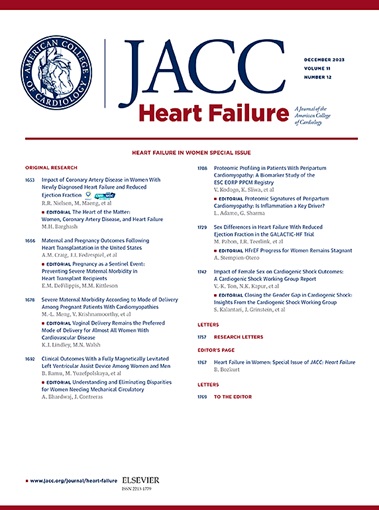急性心力衰竭的利尿增强策略。
IF 10.3
1区 医学
Q1 CARDIAC & CARDIOVASCULAR SYSTEMS
引用次数: 0
摘要
一些试验评估了以利尿剂为基础的策略来改善急性心力衰竭(AHF)患者的症状和预后。作者试图总结不同的联合策略对AHF患者的症状、体征、生理变量和结局的影响。12项试验评估了在AHF常规治疗中加入噻嗪类利尿剂、钠-葡萄糖共转运蛋白2抑制剂、矿皮质激素受体拮抗剂、抗利尿素受体拮抗剂、碳酸酐酶抑制剂或循环利尿剂强化的效果。这些试验评估了充血和症状的短期标志,没有一项试验为临床结果提供动力。短期反应(如呼吸困难缓解、身体充血症状和体重变化)在不同研究中差异很大;所有利尿剂策略都伴有血清肌酐的短期升高,并且没有显示出对死亡率或复发性心力衰竭事件的益处。现有证据表明,循环利尿剂的强化可以缓解身体充血的迹象,但不同的短期充血策略对健康状况和长期结果的重要性尚未确定。本文章由计算机程序翻译,如有差异,请以英文原文为准。
Diuretic Potentiation Strategies in Acute Heart Failure
Several trials have evaluated diuretic-based strategies to improve symptoms and outcomes in patients with acute heart failure (AHF). The authors sought to summarize the effect of different combination strategies on symptoms, physical signs, physiological variables, and outcomes in patients with AHF. Twelve trials were identified that assessed the addition of thiazide diuretics, sodium-glucose cotransporter 2 inhibitors, mineralocorticoid receptor antagonists, vasopressin receptor antagonists, carbonic anhydrase inhibitors, or loop diuretic intensification to conventional therapy for AHF. The trials evaluated short-term markers of congestion and symptoms, and none were powered for clinical outcomes. Short-term responses (such as relief from dyspnea, physical signs of congestion, and weight change) varied greatly across studies; all diuretic strategies were accompanied by short-term increases in serum creatinine and did not demonstrate benefits on mortality or recurrent heart failure events. The available evidence suggests that intensification of loop diuretic agents produces relief of physical signs of decongestion, but the importance of different strategies for short-term decongestion strategy for health status and long-term outcomes has not been established.
求助全文
通过发布文献求助,成功后即可免费获取论文全文。
去求助
来源期刊

JACC. Heart failure
CARDIAC & CARDIOVASCULAR SYSTEMS-
CiteScore
21.20
自引率
2.30%
发文量
164
期刊介绍:
JACC: Heart Failure publishes crucial findings on the pathophysiology, diagnosis, treatment, and care of heart failure patients. The goal is to enhance understanding through timely scientific communication on disease, clinical trials, outcomes, and therapeutic advances. The Journal fosters interdisciplinary connections with neuroscience, pulmonary medicine, nephrology, electrophysiology, and surgery related to heart failure. It also covers articles on pharmacogenetics, biomarkers, and metabolomics.
 求助内容:
求助内容: 应助结果提醒方式:
应助结果提醒方式:


